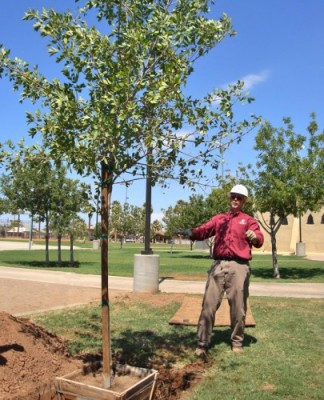by Chris Weir
 How do you share tips for greener living? Suppose that, with a few snips and a glue gun, you’ve transformed your morning O.J. container into the latest hangout for the backyard birds. Do you post pictures to a favorite Pinterest board? Or show them to friends over a fresh mimosa at Sunday brunch?
How do you share tips for greener living? Suppose that, with a few snips and a glue gun, you’ve transformed your morning O.J. container into the latest hangout for the backyard birds. Do you post pictures to a favorite Pinterest board? Or show them to friends over a fresh mimosa at Sunday brunch?
No matter how you share your creative genius, your clever repurposing is no longer some small, private act of eco-heroism. By sharing, you’ve inspired the Planeteer within everyone your story reaches.
Cities can have the same inspirational effect on one another. But because the steps to sustainable success at this level are like those of Machu Picchu when compared to creating a DIY birdhouse, sharing to bring about change is a little more complex.
The Sustainable Cities Network (SCN), a unit of Arizona State University’s Julie Ann Wrigley Global Institute of Sustainability, is dedicated to doing just that. The organization facilitates the evolution and sharing of big ideas between cities. Much like a friend who gets the gang together by hosting a potluck, SCN provides a venue for Arizona’s cities, towns, counties and tribal communities to share successes and the recipes behind them.
“We want to make it easy for cities to adopt sustainable practices,” says Anne Reichman, SCN’s program manager. “We build partnerships with communities and then bring everyone together to exchange information and figure out how to overcome sustainability challenges.”
SCN hosts meetings at regional and state levels, as well as among workgroups. Workgroups form when a member community volunteers to champion a cause for a mutual concern — energy, for example. The workgroup then pools relevant information, using it to develop projects that are feasible and enhance the livability of communities throughout the state. A city with an especially innovative approach might be invited to share its story at an upcoming meeting.
On the heels of a long, hot summer, the Green Infrastructure (GI) workgroup garners particular interest. Spurred by the success of the 2011 Regional Tree and Shade Summit — which convened public officials, municipal staff, nonprofit organizations and professional associations alike to discuss the importance of city tree and shade plans — the GI workgroup identifies strategies for creating an urban canopy that conserves water as it cools.
Quite hip to the benefits of trees and shade, Phoenix is accustomed to sharing its success stories at GI workgroup meetings. One idea that members found especially inspiring was tree tagging, which was introduced in a presentation given by Parks and Recreation Department Forestry Supervisor Richard Adkins. Tree tagging is an initiative to encourage the expansion of urban forests by illustrating their economic value. Trees in several heavily trafficked areas have been marked with eye-catching orange tags scribed with facts about their aesthetic, water-conserving and heat-relieving benefits in terms of monetary savings.
Because SCN provided a platform for Adkins to share the program’s success, cities throughout the state are considering similar urban forestry initiatives. Regardless of the shape their endeavors take — whether they use tree tags or a different medium altogether — the network that channeled their inspiration looks forward to sharing the details. And though this is one of many stories in SCN’s growing collection, it is a lush example of Arizona’s cities working together to achieve sustained success.
Chris Weir is a writer, editor and social media marketer for Arizona State University’s Julie Ann Wrigley Global Institute of Sustainability.
Photo by Eileen Kane.





